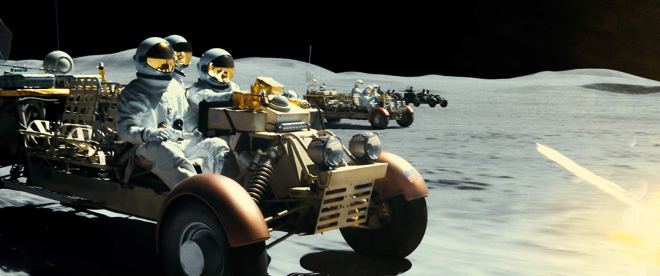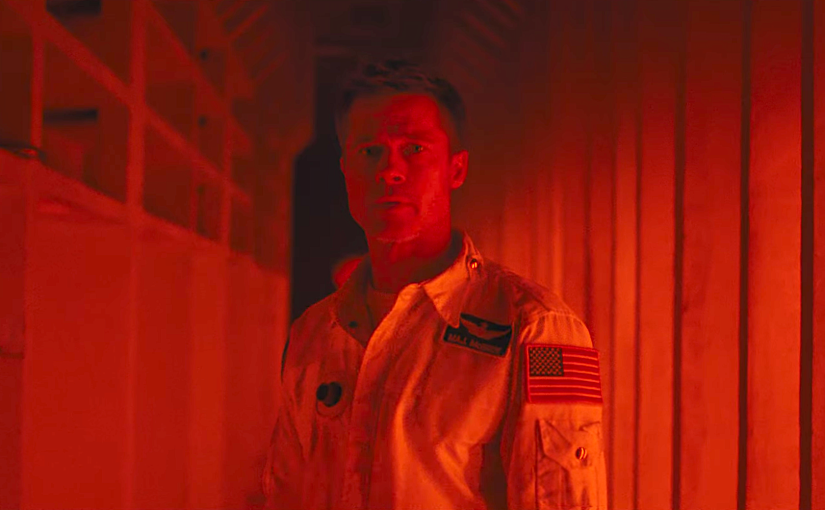A gorgeous, father-son foray into the abyss.
As you traverse James Gray’s newest foray into the endless void, time will often appear to stop. Not due to some cataclysmic event in our world, but in experiencing the utter awe Hoyte Van Hoytema’s cinematography inspires. Its beauty knows little bounds, stretching across the intimate sorrow of a man’s conflict with himself, into the paralysing abyss of open space. Go forth and fly Ad Astra – to the stars.
A very Replicant-esque opening card informs us we’re in the near future, ‘a time of hope and progress’. Gray’s vision of years ahead is fascinating: lunar travel is commercialised through Virgin, trips between Mars and Neptune only take 79 days, and there’s a massive structure built from Earth to just beyond the atmosphere. No pill is too hard to swallow: the tech is believable, but still theatrical.
Roy McBride (Brad Pitt) is content in space. It’s what he understands; the quiet, the freedom, the rules – he says he ‘always has one eye on the exit’. He’s an astronaut for SpaceCom, the overlord corporation that appears to have the monopoly on space tourism (as well as military connections). He’s also intensely, almost unhealthily relaxed, his heart rate never broaching 80bpm even in immense peril.
A catastrophic event ravages our solar system: it’s an unparalleled burst of power that sends Roy flying off an exploding satellite in low orbit and down to Earth. This sequence is brilliantly controlled by Gray – what could have so easily descended into bombastic spectacle is scarily personal, the echoing of Roy’s flailed spinning scratching away like the Gemini 8 nightmare in First Man.
This was the first instance of what will become to be known as ‘the surge’. Soon after, Roy is called from his rest to be briefed on a new mission – contact the thought-to-be-dead head of the Lima project, a doomed expedition to the outer solar system to track intelligent life, who officials believe to be the source of the dangerous burst of energy. He also happens to be Roy’s father, Clifford (Tommy Lee Jones).

All that’s missing is The Doors’ The End. While the extreme prejudice isn’t necessarily disclosed, Roy’s journey to the heart of darkness conjures memories of Captain Willard’s trek down the river. But there’s a difference in scale: Willard’s mental state was a product of war, his fascination with the destination growing out of morbid curiosity. Francis Ford Coppola also injected gratuitous levels of spectacle into Apocalypse Now, painting a damning landscape of the US’ love affair with conflict. Ad Astra, on the other hand, often feels thoroughly downbeat despite revolving around ‘a crisis of unknown magnitude’. Rather than trauma, an angsty sense of melancholy arises from Roy’s severe daddy issues.
Pitt is really rather extraordinary throughout. It’s a much more subdued performance than one may expect; rigidly stoic, upright and honed-in, the burning fire of distress gently bubbling beneath the surface, only peeking through the facade in occasional single teardrops. He’s living a life unfit for purpose, buried under the supposed legacy of his ‘hero dad’, protecting a man he barely knew but desperately wants to emulate – Roy says with pride: ‘He gave his life for the pursuit of knowledge.’ He also commandeers almost all of the film, with other cast members, such as Liv Tyler and Ruth Negga, dealt a bit of a cold shoulder considering their headline casting.
The film can feel like it has two scripts: one for the spoken word and the other for narration. Like Captain Willard, Roy’s inner monologue purrs smoothly for much of the runtime. Penned by Gray and Ethan Gross, the dialogue between characters is mostly pragmatic; rarely indulging in non-plot driven details. Roy’s headspace is much denser, adding more overtly philosophical commentary to his plight à la Malick. There are times where silence would carry more power, where you teeter on the edge of cringe, not too dissimilar to the criticism of Blade Runner‘s original voiceover – but the film’s somber nature lends tolerance to Pitt’s soothing tones.

The journey is electrified through Hoytema’s awe-inspiring eye. Bringing his Interstellar experience to the table, the incomprehensible scope of space is captured with a transportive flair – when seen in IMAX, you’d swear you were floating through the cosmos. Whether it be Earth, Jupiter or Saturn, planets are captured with crystal-clear clarity, stationed in frames like tangible wonders of the galaxy. And as for the surrounding vacuum – it is terrifying. While Ad Astra may never achieve asphyxiation on a Gravity level (not that it ever particularly aspires to this), the sense of desolation is urgent, and the visual effects are remarkable.
Moments feel designed with art in mind – even beneath the atmosphere, compositions consistently drop jaws and widen eyes. One shot in particular, of Roy running on Mars, is reminiscent of Roger Deakins’ iconic silhouette from Blade Runner 2049‘s Las Vegas wasteland. But then, it’s a disservice to Gray and Hoytema to credit their achievement to other filmmakers: there are definite strokes of Kubrick’s 2001: A Space Odyssey in there, as well as odd idiosyncratic touches he’d have loved (in one scene, there’s a random birdcage and dolls in the background that surely demand further reading). It’s the poetic optimism that makes it a quintessentially Gray feature.
All one can do is bask in the wonder Ad Astra evokes. Max Richter’s score is an enchanting blend of traditional orchestral melodies and gentle electronica – another notch on the composer’s sci-fi list after his invaluable contribution to 2016’s Arrival with On The Nature Of Daylight. It’s not overly long either, sitting at just over two hours, with enough dazzling set-pieces – such as an eye-popping, pulse-racing moon-buggy battle with pirates – to entice raw excitement as the film cruises towards a fulfilling, if slightly familiar climax.
Toxic masculinity, daddy issues and mankind’s battle with existentialism make up the poetry of James Gray’s magnificent, beautiful space odyssey.
Rating: ★★★★★
Cameron Frew – @FrewFilm
